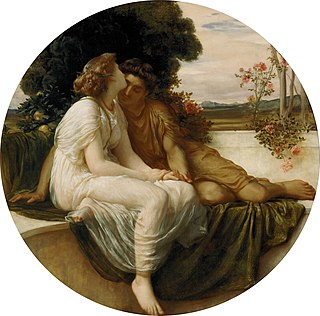Related Research Articles

Gaius Valerius Catullus, known as Catullus, was a Latin neoteric poet of the late Roman Republic. His surviving works remain widely read due to their popularity as teaching tools and because of their personal or sexual themes.
In poetry, a hendecasyllable is a line of eleven syllables. The term may refer to several different poetic meters, the older of which are quantitative and used chiefly in classical poetry, and the newer of which are syllabic or accentual-syllabic and used in medieval and modern poetry.

Sappho was an Archaic Greek poet from Eresos or Mytilene on the island of Lesbos. Sappho is known for her lyric poetry, written to be sung while accompanied by music. In ancient times, Sappho was widely regarded as one of the greatest lyric poets and was given names such as the "Tenth Muse" and "The Poetess". Most of Sappho's poetry is now lost, and what is extant has mostly survived in fragmentary form; only the Ode to Aphrodite is certainly complete. As well as lyric poetry, ancient commentators claimed that Sappho wrote elegiac and iambic poetry. Three epigrams formerly attributed to Sappho are extant, but these are actually Hellenistic imitations of Sappho's style.

The Sapphic stanza, named after Sappho, is an Aeolic verse form of four lines. Originally composed in quantitative verse and unrhymed, since the Middle Ages imitations of the form typically feature rhyme and accentual prosody. It is "the longest lived of the Classical lyric strophes in the West".
Marcus Caelius Rufus was an orator and politician in the late Roman Republic. He was born into a wealthy equestrian family from Interamnia Praetuttiorum, on the central east coast of Italy. He is best known for his prosecution of Gaius Antonius Hybrida in 59 BC. He was also known for his trial for public violence in March 56 BC, when Cicero defended him in the extant speech Pro Caelio, and as both recipient and author of some of the best-written letters in the ad Familiares corpus of Cicero's extant correspondence. He may be the Rufus named in the poems of Catullus.

The Tristia is a collection of poems written in elegiac couplets by the Augustan poet Ovid during the first three years following his banishment from Rome to Tomis on the Black Sea in AD 8. Despite five books in which he bewails his fate copiously, the immediate cause of Augustus' banishment of the most acclaimed living Latin poet to Pontus remains a mystery. In addition to the Tristia, Ovid wrote another collection of elegiac epistles on his exile, the Epistulae ex Ponto, as well as a 642-line curse poem called Ibis, directed against the unnamed enemy who had apparently caused his downfall. He spent several years in the outpost of Tomis and died in AD 17 or 18 without ever returning to Rome.

The history of Latin poetry can be understood as the adaptation of Greek models. The verse comedies of Plautus, the earliest surviving examples of Latin literature, are estimated to have been composed around 205–184 BC.

Lesbia was the literary pseudonym used by the Roman poet Gaius Valerius Catullus to refer to his lover. Lesbia is traditionally identified with Clodia, the wife of Quintus Caecilius Metellus Celer and sister of Publius Clodius Pulcher; her conduct and motives are maligned in Cicero's extant speech Pro Caelio, delivered in 56 BC.
The Neoterikoi or Neoterics were a series of avant-garde Latin poets who wrote in the 1st century BCE. Neoteric poets deliberately turned away from classical Homeric epic poetry. Rather than focusing on the feats of ancient heroes and gods, they propagated a new style of poetry through stories that operated on a smaller scale in regard to themes and setting.
Catullus 51 is a poem by Roman love poet Gaius Valerius Catullus (c. 84 – c. 54 BC). It is an adaptation of one of Sappho's fragmentary lyric poems, Sappho 31. Catullus replaces Sappho's beloved with his own beloved Lesbia. Unlike the majority of Catullus' poems, the meter of this poem is the sapphic meter. This meter is more musical, seeing as Sappho mainly sang her poetry.

Catullus 3 is a poem by Roman poet Gaius Valerius Catullus that laments the death of a pet sparrow (passer) for which an unnamed girl (puella), possibly Catullus' lover Lesbia, had an affection. Written in hendecasyllabic meter, it is considered to be one of the most famous of Latin poems.

Catullus 2 is a poem by Roman poet Gaius Valerius Catullus (c. 84 – c. 54 BCE) that describes the affectionate relationship between an unnamed puella ('girl', possibly Catullus' lover, Lesbia), and her pet sparrow. As scholar and poet John Swinnerton Phillimore has noted, "The charm of this poem, blurred as it is by a corrupt manuscript tradition, has made it one of the most famous in Catullus' book." The meter of this poem is hendecasyllabic, a common form in Catullus' poetry.

Catullus 12 is a poem by the Roman poet Catullus. In it, he chides Asinius Marrucinus for stealing one of his napkins, calling it uncouth and noting the disapproval of his brother, Pollio. Note the reversal of the praenomen and nomen in the first line. While "Asini Marrucine" could be translated simply as "Asinius Marrucinus", the inverted word order introduces the alternative meaning "Marrucinus [son] of a jackass". Napkins in Ancient Rome were handmade and therefore far more valuable than they are today; also, Catullus has a sentimental attachment to the napkins, as they were a gift from two close friends, Fabullus and Veranius. In comparison to Catullus's other invective poetry, this is relatively light: the main point of the poem could be to praise Pollio rather than to chide Marrucinus.

Catullus 5 is a passionate ode to Lesbia and one of the most famous poems by Catullus. The poem encourages lovers to scorn the snide comments of others, and to live only for each other, since life is brief and death brings a night of perpetual sleep. This poem has been translated and imitated many times.

The poetry of Gaius Valerius Catullus was written towards the end of the Roman Republic in the period between 62 and 54 BC.
Catullus 16 or Carmen 16 is a poem by Gaius Valerius Catullus. The poem, written in a hendecasyllabic (11-syllable) meter, was considered to be so sexually explicit following its rediscovery in the following centuries that a full English translation was not published until the 20th century. The first line, Pēdīcābo ego vōs et irrumābō, sometimes used as a title, has been called "one of the filthiest expressions ever written in Latin—or in any other language".
Poem 68 is a complex elegy written by Catullus, who lived in the 1st century BCE during the time of the Roman Republic. This poem addresses common themes of Catullus' poetry such as friendship, poetic activity, love and betrayal, and grief for his brother. The poem is addressed to his friend, Manius or Allius, and engages with scenes from the myth of Troy.
Aeolic verse is a classification of Ancient Greek lyric poetry referring to the distinct verse forms characteristic of the two great poets of Archaic Lesbos, Sappho and Alcaeus, who composed in their native Aeolic dialect. These verse forms were taken up and developed by later Greek and Roman poets and some modern European poets.
Sappho 31 is a lyric poem by the Archaic Greek poet Sappho of the island of Lesbos. The poem is also known as phainetai moi after the opening words of its first line. It is one of Sappho's most famous poems, describing her love for a young woman.
Marilyn B. Skinner is Professor Emerita of Classics at the University of Arizona. Described as "one of the most sophisticated and accomplished classical scholars today", she specialises in ancient sexualities, gender, feminist theory, and classical poetry, particularly from the Roman Republic and Augustan age.